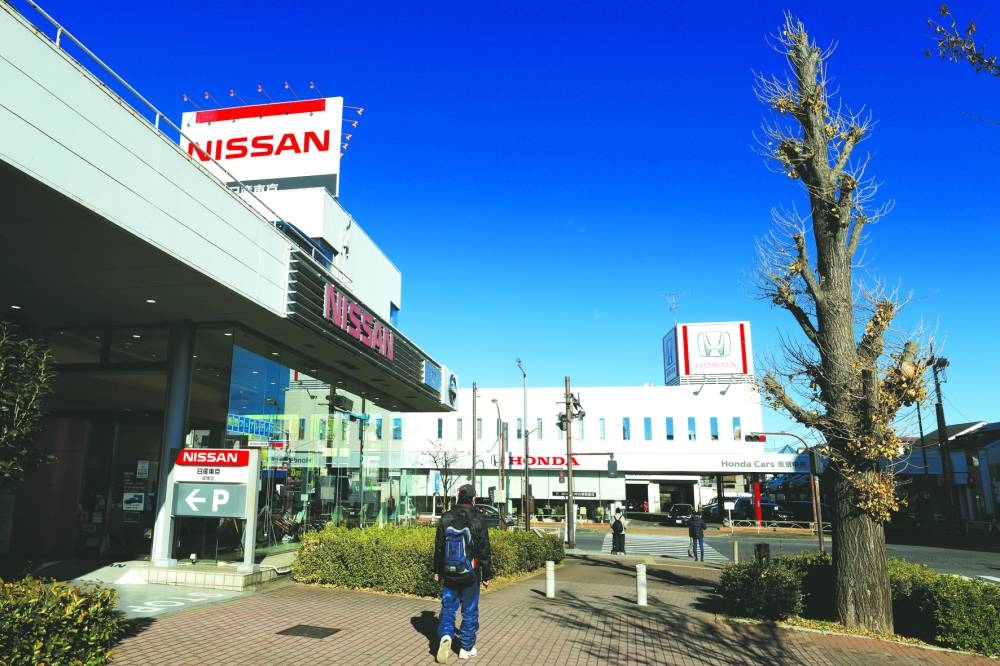Japan’s record deal-making activity this year isn’t giving foreign firms much holiday cheer: For now, the field remains mostly dominated by the local mega banks and law firms with deep ties to the corporate world.
At roughly $200bn, the volume of transactions including mergers and acquisitions in the country is up 48% this year, data compiled by Bloomberg show. That compares with a 17% increase across Asia Pacific and a 19% slump for China, which remains the biggest market in the region with $271bn in volume.
The sheer amount of activity is reshaping the battleground for investment bankers seeking to earn the often lucrative fees that come with these transactions. Just as the year winds down, one deal has left bankers scrambling to take part in: Honda Motor Co’s acquisition talks with Nissan Motor Co.
The tie up could potentially form the world’s third-largest carmaker. But while the big international investment banks win advisory roles on some deals, Japanese firms historically have a big hometown advantage, according to data compiled by Bloomberg. And among law firms, the preference for Japanese involvement is even more stark with local firms taking the top five spots.
“While some foreign banks have been relatively successful in Japan and they continuously pitch and work on many deals, the reality is the Japanese megabanks have much more access to companies due to their lending and underwriting relationship,” said Akio Katsuragi, co-founder and chief executive officer of investment banking boutique Crosspoint Advisors.
Partly, this reflects the industries prominent in some recent deals in strategically important sectors such as technology, which makes it even harder for foreign buyers, where global investment banks may have an edge over their local rivals. One such example is Japan Industrial Partners’ $15bn takeover of conglomerate Toshiba Corp, in which Katsuragi’s firm was a lead adviser. Other banks that worked on the deal included Sumitomo Mitsui Financial Group Inc, Mizuho Financial Group Inc, Nomura Holdings Inc, as well as overseas banks such as JPMorgan Chase & Co and UBS Group AG.
The planned union of Honda and Nissan is one of those evergreen deals that has been talked about for years, according to Katsuragi, who was previously CEO of Lehman Brothers Holdings Inc’s Japan office. The time is right for the deal to happen, he added, otherwise they might struggle to survive in a very competitive global market.
The two companies earlier this week reached a tentative agreement to set up a joint holding company that will aim to list shares in August 2026. While their executives have been careful to paint the transaction as a merger of equals, Honda will take the lead in forming the new entity and nominate a majority of its directors.
“There is still a preference to find a Japanese solution when it comes to big deals, especially if there is a possibility of combining two national champions or finding local investors as a way to preserve some of the national-trophy assets,” said Takeshi Nakao, managing partner at law firm Freshfields Bruckhaus Deringer LLP in Tokyo.
Other deals receiving foreign interest but facing local resistance in Japan include Quebec-based Alimentation Couche-Tard Inc’s pursuit of the owner of 7-Eleven convenience stores. Banks working on the potential cross-border deal include Goldman Sachs Group Inc, Morgan Stanley and Nomura.
After the operator of Circle K stores made its intentions known, Seven & i Holdings Co considered a management buyout to take itself private with funding from banks, Itochu Corp and the founding Ito family in a transaction that could be worth around $58bn, Bloomberg News reported. Banks that may provide financing for what could be the largest-ever such deal in Japan include Sumitomo Mitsui, Mitsubishi UFJ Financial Group Inc and Mizuho.
“If Seven & i is possible, then anything could get done, other than certain assets in strategic and sensitive industries,” said Nakao of Freshfields.
Nippon Life Insurance Co has done more than $12bn in deals this month alone, and Japan’s biggest insurer isn’t finished yet. There’s also Bain Capital’s ongoing plans to buy shares of software developer Fuji Soft Inc without the support of the Japanese company’s board, setting the stage for a rare hostile bid in its battle with KKR & Co for the Yokohama-based firm.
“This is the busiest ever we have seen in Japan dealmaking,” Nakao said. “Deals in Japan are going to get even bigger, both inbound and outbound.”
The deal bonanza has also been buoyed by a strong stock market, with the benchmark Nikkei 225 index reaching an all-time high in July. It has gained more than 20% this year.
Outside of Japan, India was the other hot spot for deals this year, with a record $20bn raised in initial public offerings and $97bn in other transactions including M&A.
Investment bankers in Japan have also been busy on equity capital markets transactions as global investors continue to pile into Japanese stocks. About $6.3bn was raised via IPOs in Japan since January, according to data compiled by Bloomberg.

A Nissan Motor Co dealership, left, and a Honda Motor Co dealership in Tokyo. Japan’s record deal-making activity this year isn’t giving foreign firms much holiday cheer: For now, the field remains mostly dominated by the local mega banks and law firms with deep ties to the corporate world.
